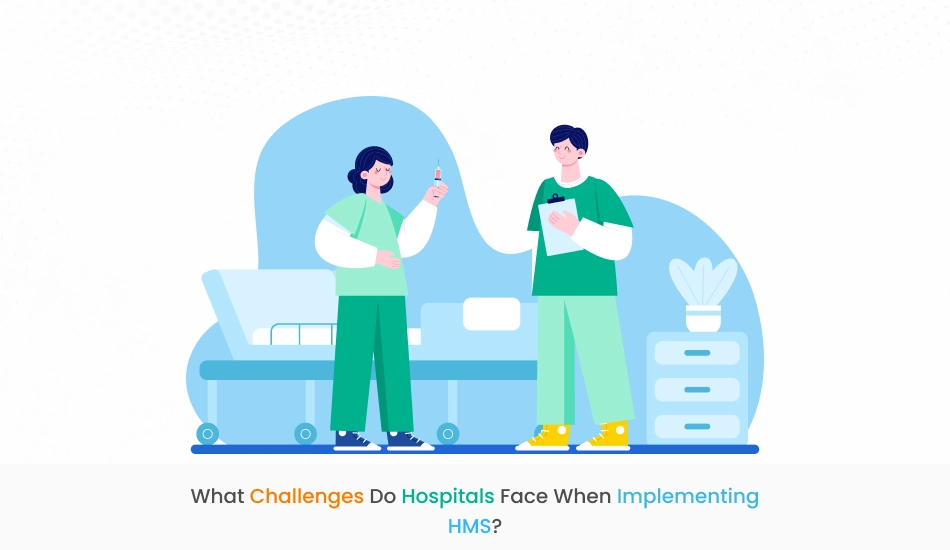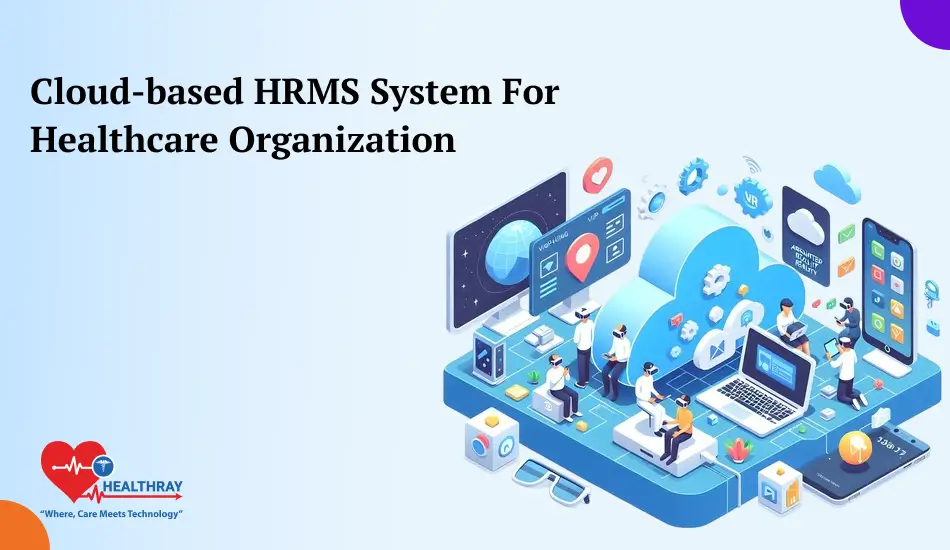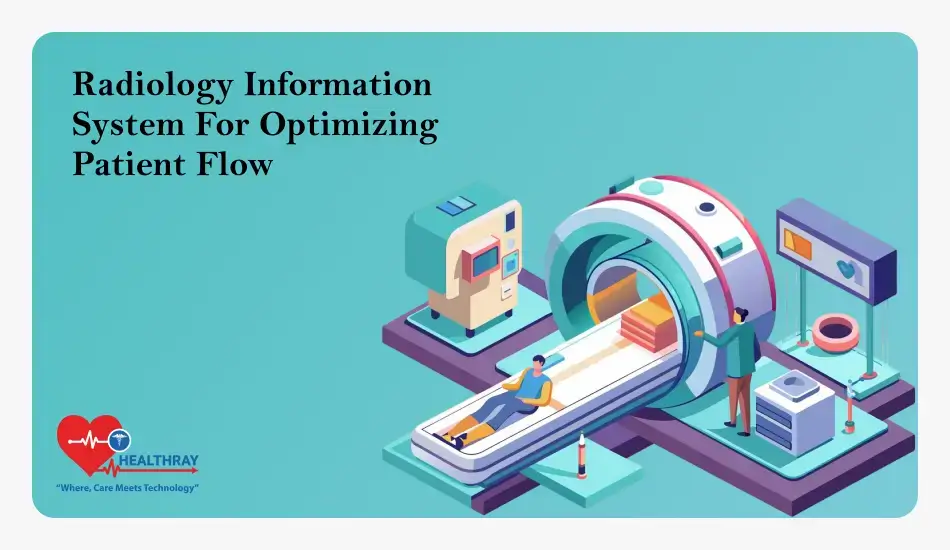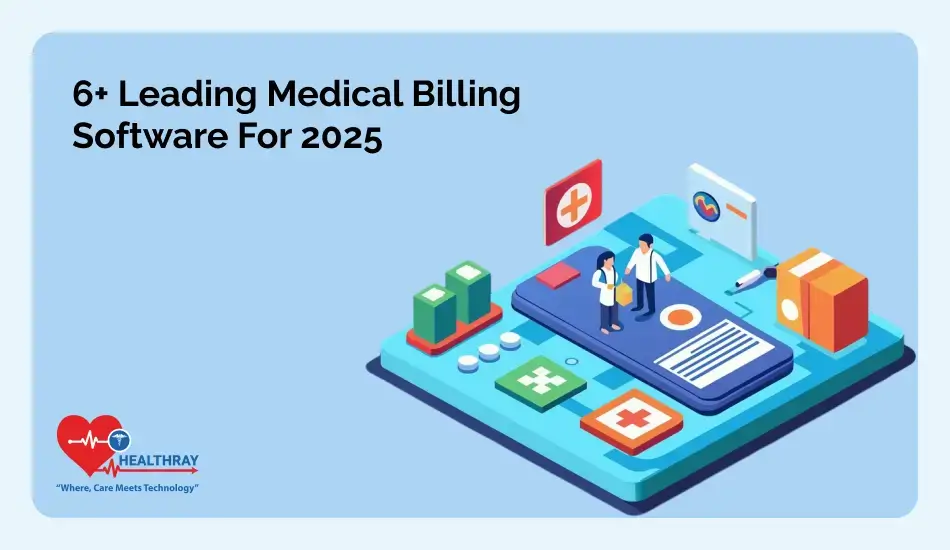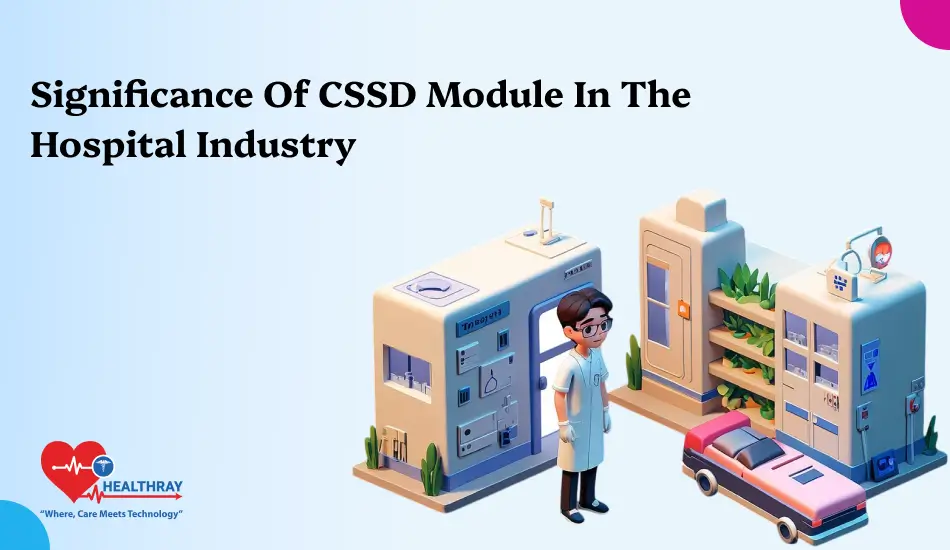Quick Summary
Receiving Hospital Management Systems (HMS), hospitals face obstacles to solutions such as information security risks, communication and interoperability issues, user adoption barriers, adaptability issues, and staff preparing requirements. Overcoming these obstacles is basic in order to integrate and utilize these solutions effectively.
Introduction
As we see around, hospital management software system, become a necessity for healthcare institutions. Over 90% of hospitals integrate modernized healthcare software for the smooth management system. As per survey, more than 30% people face hurdles while deploying the healthcare software platform.
When you compare the healthcare industry with others, you will notice that it is progressing and improving faster with advanced technology. One of these technologies is hospital management systems (HMS). But know that changes are always accompanied by benefits and obstacles. Hence, there are two ways to deal with it: either accept the traditional approach or overcome the obstacles that come in the way of accepting new technology.
It has been decades since AI enabled hospital management system or software was used in healthcare facilities. Most healthcare organizations have already adopted HMS in India. However, many of these have faced plenty of challenges while implementing this system. Hence challenges can arise not only during implementation of hospital management systems or software but also during implementation. Two significant obstacles faced are human and technical.
There are a number of difficulties while integrating hospital management system software. Hurdles may include while integrating the legacy system with the hospital software and data migration is one of the major troubles. Compatibility, the reason behind it. It happens because of the legacy system, built from outdated technology. However, new software develops with the modern programming languages.
When putting HIMS into practice, all hospitals encounter difficulties. In this text, we will discuss the challenges that can come with implementing a hospital management system and provide ways to overcome these challenges. In addition, let’s begin this adventure!
What is a hospital management system?
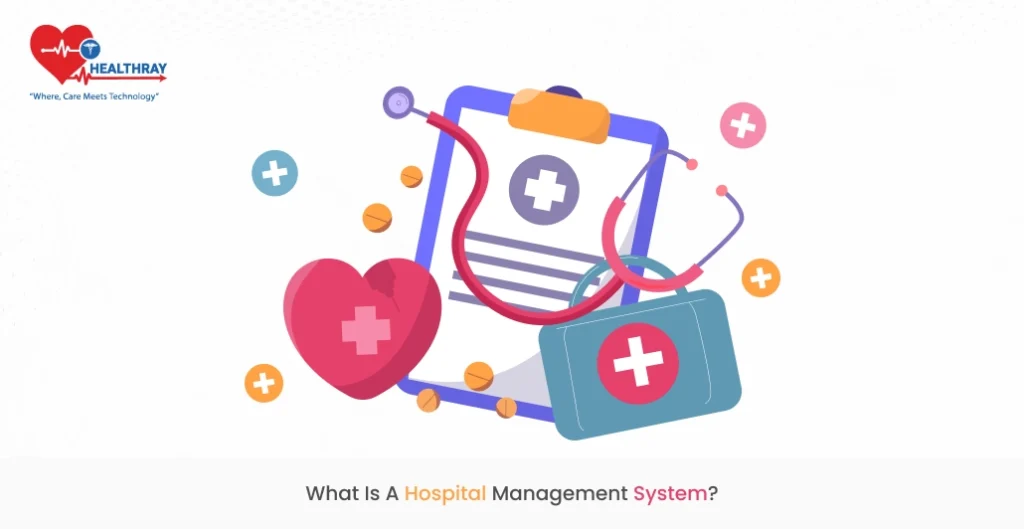
HMS stands for hospital management system, which can also be stated as a hospital database management system or information and communication system, is software industrial equipment or hardware that helps healthcare facilities manage operations. You can also consider it an integrated software industrial hardware that can help manage hospital resources and functions efficiently by bringing valuable data from all the hospital departments into a single network.
An efficient hospital management system benefits a team of doctors, health workers, nurses, pharmacists, and specialists. Hospital management systems increasingly use technology to streamline processes and make them efficient. Hence it means that a professional will be able to track patients’ records under a single framework.
The hospital management software creates information, executes clinical activities, helps in supervising information, and monitoring from your convenient location. It minimizes the corridor’s crowd, reduces patient efforts, handles massive amounts of revenue, analyzes big information, improves customer services, and streamlines in administrating healthcare inventories. Therefore, the HIMS system increases physician efficiency, instant updating data, and digitizing clinical operations. Let’s throw the lights on the some of the functions of the hospital management system :
- Appointment scheduling : Furnishing the slots to your patients and they can effortlessly fix their bookings.
- Patient Portal : Streamlining to set up a meeting, analyze treatment reports, and remote consultation.
- Digital billing system : Create the tailored bills as per the patient need and embedded protocols for enhancing security.
- Security management : Applying the number of security techniques and following authoritative guidelines like HIPAA, GDPR, and European commission.
- Financial management : Retaining the healthcare finance information and utilizing methodologies for processing well, helping to make informed decisions.
- Speech Recognition : Swiftly converting dictated words into sentences after applying natural language processing language.
- Radiology information system : Keep the radiology images along with \patient necessary information.
- Customized templates : Crafted the assorted hospital forms in no time including bills, discharge, and patient registration due to extreme flexibility.
- Bio-medical waste : Not only healthcare equipment or assets, the HMS software disposes the healthcare waste as per guidelines.
- Bed management : Storing the ward information along with the available beds and number of admitted patients.
- Inventory or asset management : Keeping all healthcare inventories under the similar healthcare platform and analyzing it well for reducing future loss.
Not limited to these features, but there are more for it. Difficulty measuring the depth of the healthcare information management system.
Hence, they can be informed about the entire process from start to finish. A few years back, hospital management software in India needed the latest technology, but now they are well equipped with the best technology. Hence, by now, the majority of hospitals use advanced hospital software systems or remote solutions or software systems building automation and management systems for managing hospital operations. There are two varieties of HMS remote solutions on the market:
- Application Service Provider/Cloud
- Enterprise (On-Premise) Software
At its basic level, HMS stands and aims to create products to simplify clinician workflow, reduce administrative costs, increase productivity, reduce errors, and empower patients with the best care. A single system encompasses a variety of functions as it manages all branches of a hospital under one roof. It is considered the mother of all medical software systems because it acts as a consolidator of industrial information. mother of all medical software systems because it acts as a consolidator of industrial information.
List of challenges that come in the way of HMS implementation
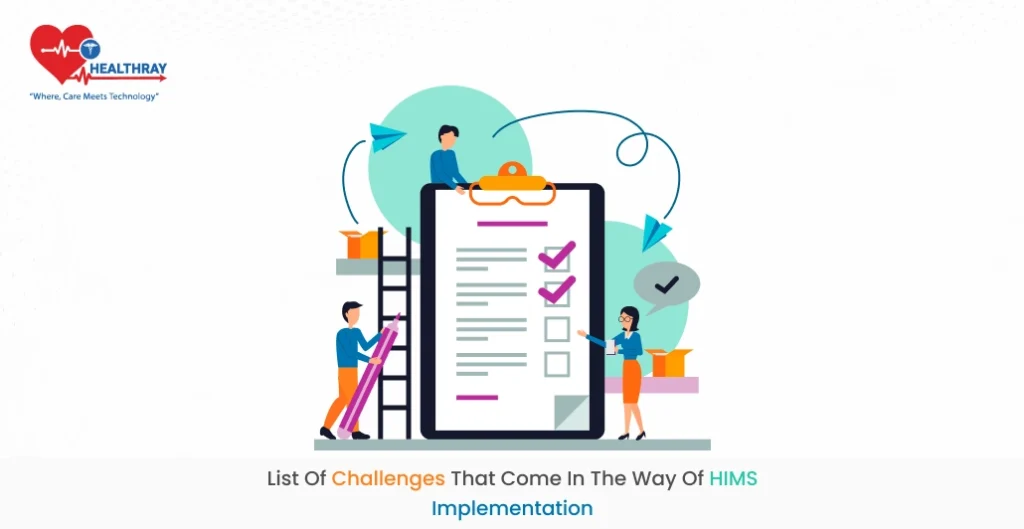
There are various challenges that a hospital management system has to face as it has to handle plenty of valuable data, including personal information, comprehensive medical data, medical histories and more. Hence, it could be a significant cause of concern. The following are some typical difficulties encountered when putting hospital management systems in place:
Human challenges
Certain human factors count as a challenge when you think about implementing HMS in your hospital. These factors include:
- Being aware of the advantages and importance of HMS networks
- Having general knowledge and experience of computer systems
- Beliefs and impressions of HMS leading to the usage of HMS
Three primary human problems that people encounter when implementing HMS have been recognized by researchers and experts. Thus, these difficulties are:
- The professionally trained healthcare faculty are lesser, and they lack complete knowledge of similar technologies
- Not accepting HMS software properly
- Lesser health informatics passionate professionals can create and implement techniques.
Hence there are a few more reasons behind the unsuccessful implementation of HMS:
- Character of medical professionals
- Reduced time allotted for HMS software usage and training
- Reduced encouragement, drive, and more for medical professionals
Certain research shows that HMS operates and requires a lot of time and effort for implementation and maintenance of manufacturing it. Hence, any obstacle to manufacturing it can lead to decreased production.
Technical challenges
Numerous technical obstacles contribute to the HMS adoption in hospitals failing. Here are the technical challenges to be faced in implementation:
- There are different maintenance problems for networks and computers
- Lesser data entry and retrieval standards
- Facing difficulties in training users technically
All of these technical challenges can obstruct the implementation of HMS in healthcare settings. It becomes quite difficult for healthcare organizations to deal with less informed staff and technically uninformed people.l challenges can obstruct the implementation of HMS in healthcare settings. It becomes quite difficult for healthcare organizations to deal with less informed staff and technically uninformed people.
Overcoming Human Challenges in HMS Implementation: Easy Tips for Success
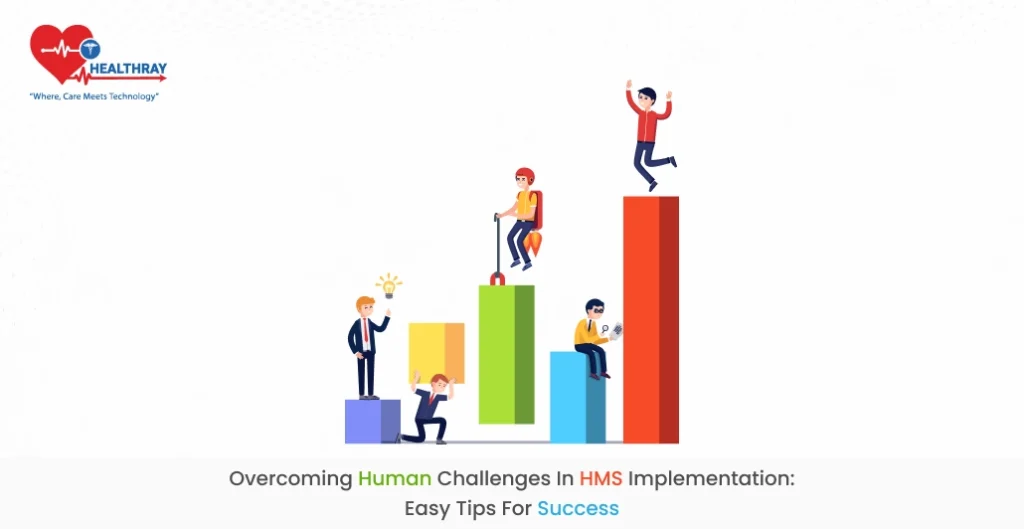
Change management and resistance
It would help if you involved the staff at a fundamental level of implementation of HMS software. Many times the staff is resistant to the new technologies. It can be because they’re afraid of losing their jobs. Therefore, you should talk about the benefits of HMS transparently. You can also address concerns and provide training and support. Provide open discussion for acceptance of the new system.
Bridge training and skill gap
There is a high chance that all the team members might need to be proficient in using technology. They might need help navigating through complexities. Hence, comprehensive training sessions within the healthcare facility should be provided. Additionally, you can offer them more guidance and practical knowledge so they can use HMS efficiently. You can also offer refresher courses or access to user manuals.
Avoid workflow disruption
Implementing HMS software might disrupt the entire workflow, which can create inefficiencies and frustration in staff at the initial phase. Hence, it is advisable to go through the current workflow and identify the area where HMS is responsible for streamlining the process. Thus, work for a plan that can ensure that this software aligns with the needs rather than disrupting the workflow.
Looking after data security concerns
Healthcare facilities are known to store and handle sensitive information. Thus, one of the healthcare organization’s key priorities is data security. It would help if you addressed every security concern by implementing robust security protocols and compliance rules. Educate your employees on data protection best practices. You can also ensure a culture of accountability for the same.
Strong leadership support
HMS implementation may fail if there is no strong leadership support. As a result, you should involve leadership from the outset of the implementation process. One can ensure commitment to the implementation of HMS System initiatives. Also, staff should be encouraged by talking about its strategic importance and allocating resources correctly. You should have active participation and demonstration of enthusiasm can be helpful.
Overcoming Technical Challenges in HMS Implementation: Easy Tips for Success
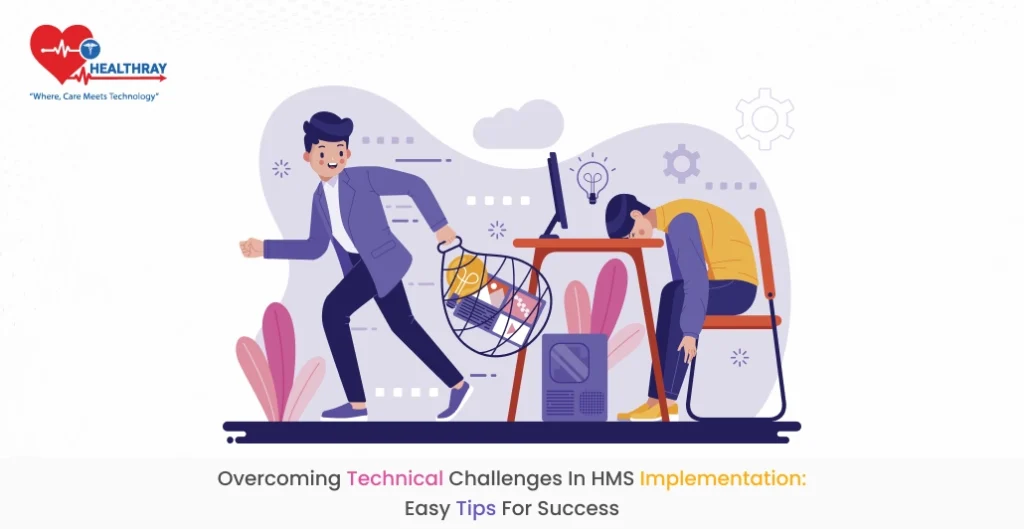
Deal with data migration problems
Transferring data from manual records to automated systems is one of the main technical obstacles in the HMS implementation process. There are chances of data migration errors, loss of critical information, and inconsistency. It could eventually cause operational disruptions. Hence, you can look after quality assurance and validation during the entire migration process. Develop a plan before you conduct the whole process of migration.
One of the greatest solutions is healthcare management software because it identifies information and corrects it before migrating to another system. Furthermore, holds details with endless capacity and tracks at any moment. With the rise in a number of patients, it is manageable to record their data and execute their medical tasks smoothly. The hospital system improves clinical workflows, enhances service quality, and doubles ROI.
Integration with existing system
Healthcare facilities are known to have systems such as electronic health records, laboratory management systems, and even billing systems. Hence, HMS must integrate seamlessly without any issues in data formats, protocols, and more. Therefore, a complete assessment of the existing systems and their compatibility must be made. Also, choose an HMS with great interoperability.
Scalability and performance
As the healthcare organization keeps on evolving, an HMS must be capable of scaling and handling vast amounts of data, user traffic, and transactions. Hence, having a system that performs poorly, has slower response times, and downtime can be problematic. Therefore, plan for scalability before you choose HMS software. Make sure to conduct performance testing and optimization to avoid any blockages.
Security and compliance
Data in the healthcare sector is susceptible and might be subjected to more significant risks. Hence, ensuring data security and confidentiality can ensure adherence can be challenging. Make sure to implement some robust security measures such as encryption, access controls, and trails to protect patient information. Also, get some regular assessments for security and regulatory compliance.
How Healthray can help you with a hospital management system?
Step towards digital era with our healthcare solution
Revamp your hospital facilities and embrace change for better healthcare management. Ease in managing and organizing large medical datasets leads to effective analysis. Seize the opportunity now!
Healthray’s HMS is a perfect example of technology meets innovation. Our advanced hospital, hospital patient management software and communication technology system can be what your hospital lacks now. With its feature set, everything is possible, from appointments to smooth check-in and the rest of the treatment process.
Our software streamlines every step of the process. Hence our HMS network makes administrative tasks more manageable, booking appointments hassle-free, collecting data smoothly, and freeing up time for better patient care. Our adaptable software may be tailored to your unique requirements regardless of the size of your clinic or hospital.
Want to know what our best-in-class Hospital Patient Software can do for your healthcare organization? Here’s what it can do:
- Improved Efficiency
- Enhanced Patient Care
- Better Communication
- Cost Savings
- Accurate Billing And Revenue Management
- Data Security And Compliance
- Enhanced Decision-Making
- Patient Engagement
- Streamlined Workflow
- Remote Access And Telehealth
- Efficient Resource Management
- Enhanced Reporting
Contact us now to get the best hospital patient management system for your hospital or healthcare organization!the best hospital patient management system for your hospital or healthcare organization!
Conclusion
HMS stands for hospital management system which is an essential component of contemporary healthcare. It boosts patient outcomes, lessens medical errors, and even improves the overall quality of care. It helps hospitals by providing them with a centralized platform that can manage all operations, introduce automation to repetitive tasks, and enhance communication.
Implementing HMS into existing hospital systems can help deliver greater benefits to all parties involved. But to implement the system correctly, you will have to follow the right steps and contact the right vendor.
At Healthray, we believe in developing best-in-class hospital management systems selling products and remote solutions that can usher in a new era of better hospital management. We would love to help your healthcare organizations with our HMS software.
